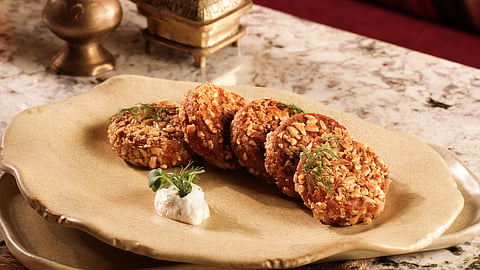

When British India was split into two in 1947, so were its kitchens. The Partition wasn't merely a geopolitical rupture, but a cultural one. Families were torn apart, and with them, recipes, rituals, and regional flavours were scattered across newly drawn borders. In the midst of this massive displacement, food became a vessel of memory, a way to preserve identity when everything else felt lost.
At Qavalli in Delhi, owners of the establishment Dinesh and Pooja Arora are bringing those memories back to the table with their new menu, Rivayat-e-Hind. Drawing from heirloom family recipes, the menu revives flavours that once brought people together. “In a rapidly modernising world, these age-old recipes and techniques were at risk of being forgotten. We felt it was the right moment to revive them,” say the Aroras.
The menu spans starters, mains, breads, and desserts — each dish selected for its story. “We travelled to towns and villages, documenting recipes and techniques that were at risk of being lost,” they say. Their research included rare manuscripts, family heirlooms, and conversations with culinary custodians and historians across India. “Some were over a century old, detailing royal kitchens and regional specialties.”
Both Pooja and Dinesh grew up in homes where food was a “medium of storytelling”. Pooja’s grandmother, the family’s culinary torchbearer, preserved recipes in handwritten journals and taught her to cook with the seasons. Dinesh’s family relied on oral traditions and old notes — safeguarding flavours from across the pre-Partition landscape.
Chef Siraj Ul Haq, Qavalli’s head chef, highlights dishes like the Peeli Mirch Chicken Tikka, Paneer Pasanda, and the Mutton Moongfali Kebab, made with tender mutton mince and coated in crushed peanut crumbs, the kebab is melt-in-the-mouth soft, rich, and nutty. “It’s a recipe we traced through a royal household’s records. The peanuts don’t just add flavour, they retain moisture,” says Dinesh. It’s a recipe the Aroras admit was particularly challenging to recreate due to its intricate preparation. Another standout is the Amritsari Maacchi, a Punjabi take on British fish and chips. The dish features crispy batter-fried fish, soft potato fries, and mint chutney. “It pays tribute to Punjab’s street food culture that thrived on both sides of the border,” he adds.
No Partition-inspired menu is complete without dishes from across the border. Enter the Multani Paneer Tikka, tracing its roots to present-day Pakistan. Stuffed with mashed potato and carrots, served on a bed of makhni emulsion, it’s mellow and earthy, thanks to a marinade of mustard oil, kasuri methi, and anardana. The dish draws inspiration from one that Pooja’s grandmother often made at home. “For me, it’s a way of honouring women who carried recipes in their memories across generations,” says Pooja.
Then there’s the Khatti Methi Bhein, made with lotus stem, jaggery, and tamarind. “It’s a forgotten gem from agrarian Punjab,” says Dinesh. “Most urban diners haven’t even heard of lotus stem, but it was once common near riverbanks and canals. Its crispness and ability to soak in flavour make it incredibly special.”
With Rivayat-e-Hind, the Aroras aren’t just feeding guests, but stirring memories. “We aim to evoke a sense of connection to history, culture, and shared heritage,” they say, hoping to remind diners of everything we almost lost, and everything that still lives on through the language of food.
Rivayat-e-Hind is available at Qavalli, Epicuria, Nehru Place, from 12 PM to 12 AM till May 31. Meal for two: ₹3.000 without alcohol (inclusive of taxes).